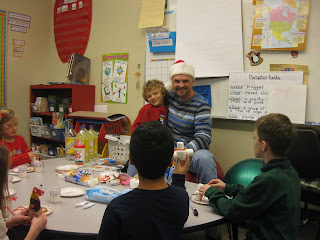 Parents are their child's first teachers. Why should that stop once our children start school? As a matter of fact I would argue that it is even more important. Research studies consistently reveal that high student achievement and self-esteem are closely related to positive parental participation in education. Parents AND teachers need to work together to provide the best for our children. To provide the best opportunity for our children's success, parents must find time to participate in their education and schools must provide the supports necessary for them to be involved. That is why at CH we expect parents to be involved. Yes, sometimes that is not easy-especially in these economic times. But we have single parents, working and going to school that are actively helping at the school.
Parents are their child's first teachers. Why should that stop once our children start school? As a matter of fact I would argue that it is even more important. Research studies consistently reveal that high student achievement and self-esteem are closely related to positive parental participation in education. Parents AND teachers need to work together to provide the best for our children. To provide the best opportunity for our children's success, parents must find time to participate in their education and schools must provide the supports necessary for them to be involved. That is why at CH we expect parents to be involved. Yes, sometimes that is not easy-especially in these economic times. But we have single parents, working and going to school that are actively helping at the school.Below is a list of 50 ways parents can help schools in their child's education. Please look at these wholeheartedly and become involved- for YOUR child's sake.
50 Ways Parents Can Help Schools
The Center for School Change (n.d.) lists the following ways that parents can become involved in schools:
- Come to school to assist.
- Share information with a student or class about a hobby.
- Share information with a student or a class about a career.
- Share information with students about a country you visited or lived in.
- Tutor one or a small group of students in reading, math, or other area.
- Help coach an athletic team.
- Help check a student's written work.
- Help put out a school or classroom newsletter (can also be done at home).
- Help sew or paint a display.
- Help build something (such as a loft in a classroom or new playground).
- Help students work on a final exhibition or project (can also be done at home or workplace).
- Help answer the schools' phone.
- Help plan a new playground for the school.*
- Help plan a theme-based presentation for students.*
- Help present a theme-based program for students.*
- Demonstrate cooking from a particular country or culture to students.*
- Share a particular expertise with faculty (such as use of computers, dealing with disruptive students).
- Help students plan and build an outdoor garden or other project to beautify the outside of the school.
- Help coach students competing in an academic competition (such as Odyssey of the Mind, Future Problem Solving, Math Masters).
- Help bring senior citizens to school to watch a student production.
- Help arrange learning opportunities in the community.
- Help set up an internship or apprenticeship for a student at your business, organization, or agency.*
- Host a one-day 'shadow study' for one or a small group of students about your career in business or some other organization.
- Go on a local field trip with a teacher and a group of students.
- Go on an extended (3-5 day) cross-country field trip with a teacher & students.*
- Contact a particular local business or organization regarding possible cooperation.*
- Help to create a natural area outside the building where students can learn.
Serve on an advisory or decision-making committee.
- Serve on the school-wide site council.
- Serve on a school committee that reports to the site council.
- Serve on a district committee representing the school.
- Serve as an officer in the school's PTA.
- Help organize a parent organization for the school.
- Help design a parent and or student survey for the school.
- Help conduct and or tabulate results of a parent survey regarding the school.
Share information or advocate for the school.
- Serve as a member of a 'telephone tree' to distribute information quickly.
- Write a letter to legislators about the school.
- Write a letter to school board members about the school.
- Go to a school board meeting to advocate for the school.
- Go to another school to provide information about this school.
- Help design a brochure or booklet about the school.
- Help translate information from the school into a language other than English.
- Help translate at a parent-teacher conference for people who don't speak English well.
- Provide transportation to a parent-teacher conference for a parent who needs a ride.
- Write an article for publication in a magazine about the school's activities.
- Help arrange for a political leader (mayor, city council, state representative, member of Congress) to visit the school.
Increase financial resources available to the school.
- Help write a proposal that would bring new resources to the school.
- Donate money and materials to the school.
- Arrange for a business or other organization to donate materials to the school.
- Help with a fundraiser for the school.
Help other parents develop their parenting skills.
- Help teach a class for parents on ways they can be stronger parents.
- Help produce a videotape for parents on ways they can be more effective parents.
- Help write, publish, and distribute a list of parenting tips.
Source: http://www.ncrel.org/sdrs/areas/issues/envrnmnt/famncomm/pa1lk20.htm
How can I be involved in my child’s education?
http://www.kidsource.com/kidsource/content2/How.Involved.html
Nothing feels better than being there to help your child grow.



